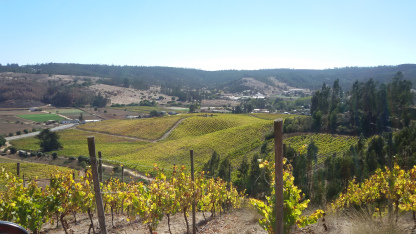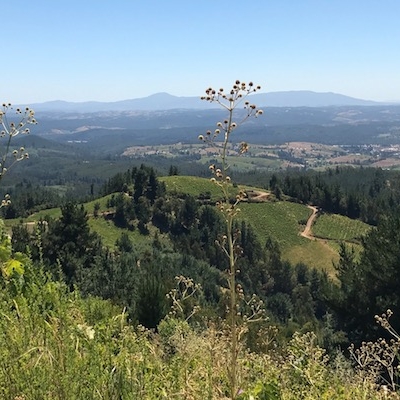Mark Squires, Wine Critic, Wine Advocate/RobertParker.Com (2006➡️06/2023), Portugal, Greece, New

Chilean Wine Industry leads on Genetic Rescue Vines and Technology challenges
 Although the Chilean wine industry is ranked at the 4th place worldwide and the first new world wine exporter, due to the agriculture movement to new production areas and continues climate challenges, the national leader industry began to concern about of the challenges that wine industry needs to face due to the extension of the wine frontier and the commercial gaps of the wineries.
Although the Chilean wine industry is ranked at the 4th place worldwide and the first new world wine exporter, due to the agriculture movement to new production areas and continues climate challenges, the national leader industry began to concern about of the challenges that wine industry needs to face due to the extension of the wine frontier and the commercial gaps of the wineries.
This process took care of the territory (Maule to Aysén Region) to identity and the new productive areas in the south, coast and mountains. During 206, it was launched the «Strategic Node Chile Vitivinícola 2.0«, which was a private-public initiative supported by CORFO (Chilean Economic Development Agency), where a broad spectrum of actors can identify gaps and technological constraints and issues of the wine industry, for the purpose of generating guidelines for advancing the development of the future actions in wine business.
The Nodo Estratégico Chile Vitvinícola 2.0 was focused in four main challenges: a) Climate Change (adaptation to effects and border agriculture), b) Development of New Products (production and market development), and c) Genetic Safeguarding (heritage, varieties and rootstocks), and d) National promotion and marketing image.
The work was focused in creating a methodology for generating concrete actions, based on diagnosis and a specific project through this initiative to reinforce the industry and determining the priorities that need to be addressed. Chile is currently the fourth exporter wines country in the world, and the next step is to be the first leading wines new world exporter into the first ranked markets, to do so, it is crucial several high technology challenges due to the wine plantation frontier extension towards the South, the Coast and the mountains cropping areas, due to the long period climate change effects on the South Hemisphere.
 The ChileVitivinícola 2.0 strategic node was a joint effort project heading up by Vinos de Chile, national association that holds over 80 wineries of Chile. The expected impact is having a great response in the «patrimonial vineyards» or «old vines» and genetic material in the central and south of Chile, and this is why the target territory covering from Maule to Aysen Region, over 1.600 km south of Santiago, where has been able to coordinate the actions with over 200 wine grapes and small and medium size wineries to participate in the business and discussion groups.
The ChileVitivinícola 2.0 strategic node was a joint effort project heading up by Vinos de Chile, national association that holds over 80 wineries of Chile. The expected impact is having a great response in the «patrimonial vineyards» or «old vines» and genetic material in the central and south of Chile, and this is why the target territory covering from Maule to Aysen Region, over 1.600 km south of Santiago, where has been able to coordinate the actions with over 200 wine grapes and small and medium size wineries to participate in the business and discussion groups.
In a certain way, Araucania Region is the latest area that has established vineyards of Pinot Noir, Sauvignon Blanc and Chardonnay over the last 10 years; however, it was found several plants of varieties like Pais, Moscatel de Alejandría varieties during the research project, among others that need to be defined with an alliance with the agricultural national institute INIA by the Ministry of Agriculture and the international center of excellence UC Davis-Chile.
BioBio and Maule, it is the most traditional old winery regions, where it can be found large extensions of Pais, Moscatel de Alejandria, Corinto, Cinsault and Carignan varieties. Currently, BioBio concentrates the production of “base wine” for sparkling wine of several central valley wineries due to the high quality of grapes in the region. The local challenge is to become a worldwide sparkling producer with fine winegrape varieties, and based on patrimonial vines like Pais, Cinsault and Moscatel as well, besides the destilled wine recovery production like it has been done with the Grapa in Italy.
Maximiliano Morales, agronomist in charge of leading the initiative says: “Due to the rescue of winegrapes projects in several areas of the South of Chile, an unique territory was found with 140 years old Malbec vines at San Rosendo location in the BioBio Region. This is creating a big expectation among the industry actors, because there was found productive vines from Cabernet Sauvignon and Cabernet Franc which will be studied, propagated and evaluated in the short term the processing and commercial potential”
 Patricia Fuentes Bórquez, CORFO´s Senior Agricultural Advisor, outlined very encouraged conclusions about the wide participation of the winery companies, academic, research and private sectors in the activities of the ChileVitivinicola 2.0 Node has been going through. At the end of the workshop roadmapping, the industry needs to build a common approach and to identify the forward market moves and those critical variables to develop a new export wines industry in the next 5-10 years.
Patricia Fuentes Bórquez, CORFO´s Senior Agricultural Advisor, outlined very encouraged conclusions about the wide participation of the winery companies, academic, research and private sectors in the activities of the ChileVitivinicola 2.0 Node has been going through. At the end of the workshop roadmapping, the industry needs to build a common approach and to identify the forward market moves and those critical variables to develop a new export wines industry in the next 5-10 years.
Chile Vitivinícola 2.0 considered several activities like international seminars, regional workshops, and business meetings, coming together over than 200 professionals and technical like viticulturists, enologists, researchers, academics, wine industry associations, entrepreneurs and executives of different public agencies to define the Roadmap for the Chilean Wine Industry.
Among the global and national excellence institutions, the strategic node Chile Vitivinícola 2.0 was the working joint efforts with UC Davis Chile – Life Sciences Innovation Center, Fraunhofer Chile, INIA (Instituto de Investigaciones Agropecuarias), R&D Consortium Wines of Chile and the Agricultural Innovation Agency by the Ministry of Agriculture.
andes@andeswines.com













